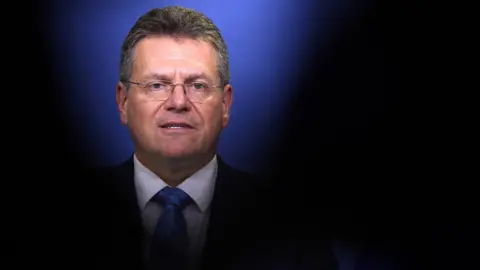Brexit: EU could move unilaterally on NI medicines issue
 Reuters
ReutersThe European Commission vice president has suggested the EU could act unilaterally to guarantee the supply of medicines from GB to Northern Ireland.
The EU is currently negotiating with the UK to try to find a joint approach on this and other NI Protocol issues.
Maroš Šefčovič said he would be discussing the issue with Lord Frost when they meet on Friday.
The EU brought forward proposals earlier this year which it said would tackle the medicines problem.
Speaking to a Northern Ireland Assembly committee on Wednesday, Mr Šefčovič said: "I would 100% prefer if we can present this good solution as a joint approach.
"But I'm fully conscious of time. I have to be very, very clear that we are ready to move on our own if it's not possible at this stage to push on a joint approach."
The protocol leaves Northern Ireland in the EU's single market for goods, a market which includes medicines.
That means goods can flow freely between the Republic of Ireland and Northern Ireland but goods arriving from the rest of the UK are subject to controls to ensure they comply with EU standards.
Northern Ireland gets most of its medicines from distributors and manufacturers in Great Britain but, due to a "grace period", controls have not yet been imposed on the movement of those products.
That grace period was due to expire in January, but the UK government has indefinitely extended it.
Some firms had notified Stormont's Department of Health that they intended to stop supplying some medicines to Northern Ireland at the end of the grace period
That is because they would have had to comply with expensive new regulatory processes to put Great Britain-sourced products on the market in Northern Ireland.
By the end of August, the health department had been notified that 910 medicines were due to be withdrawn, with a further 2,400 at risk.
In October, the EU published proposals to tackle the difficulties, which will include changing EU law.
As it currently stands the protocol would mean most products entering from Great Britain would have to undergo batch testing at laboratories in Northern Ireland, a new and significant expense.
The EU's new proposals acknowledge those requirements are too much of a burden and should be removed, subject to some conditions.
'Question of war and peace'
Also on Wednesday, French President Emmanuel Macron said the protocol was a "question of war and peace for Ireland".
Speaking to the EU Committee of the Regions, he said: "The protocol is of existential importance for Europe not to compromise when it comes to our single market, the integrity of that, otherwise there are no longer any rules at the borders.
"It's a question of war and peace for Ireland. So we should avoid any temptation to be less than serious."